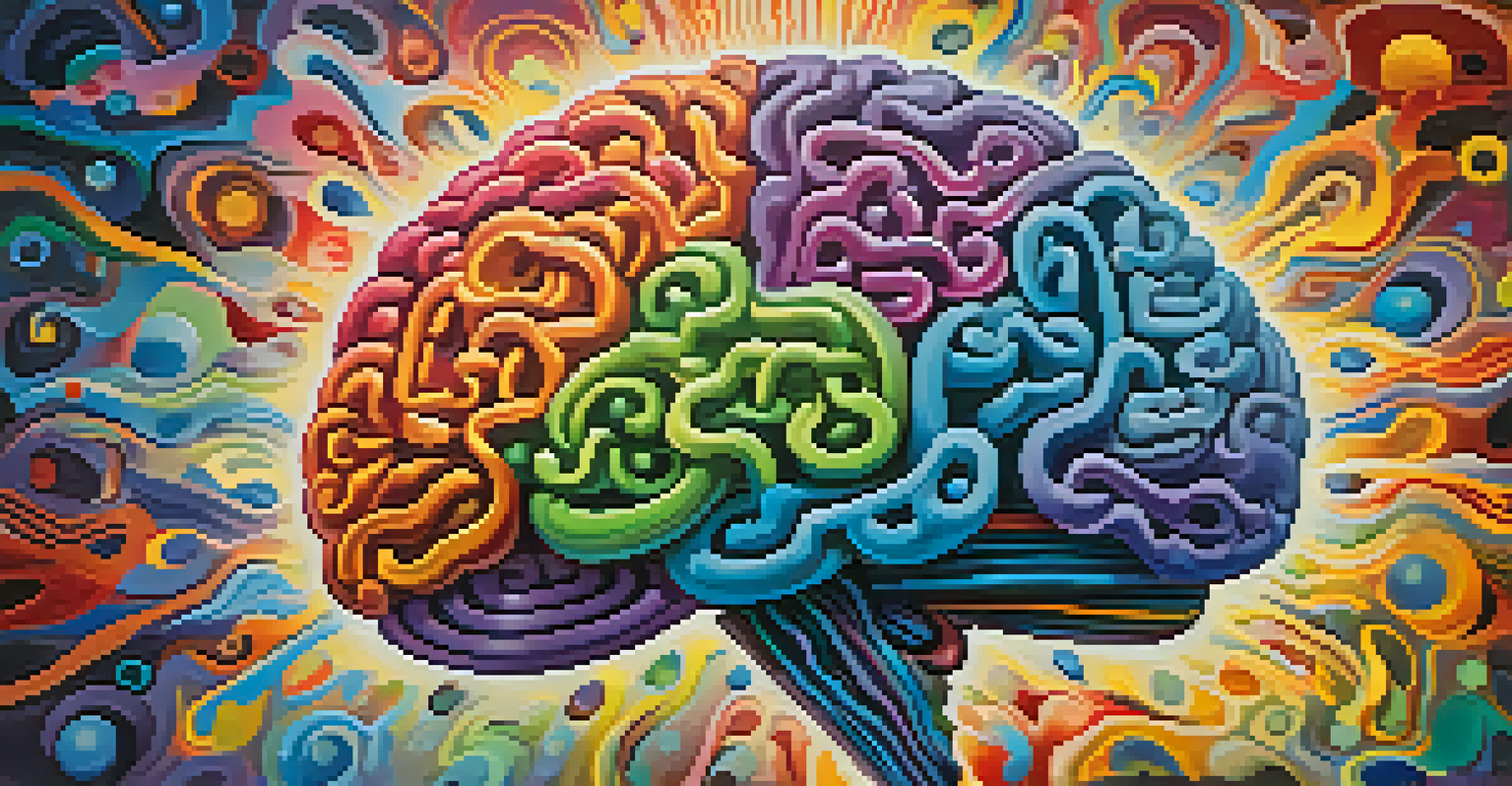Psychedelics and Inflammation: What the Research Shows

Understanding Psychedelics: A Brief Overview
Psychedelics are substances that alter perception, mood, and cognitive processes. Common examples include LSD, psilocybin (magic mushrooms), and DMT. These compounds have been used for centuries in various cultures for spiritual and therapeutic purposes.
The mind-body connection is stronger than we once thought, suggesting that our mental and physical health are deeply intertwined.
In recent years, there has been a resurgence of interest in psychedelics, particularly in the fields of mental health and wellness. Researchers are uncovering their potential to treat conditions like depression, PTSD, and anxiety. But beyond mental health, there’s growing curiosity about how these substances might help with physical ailments, such as inflammation.
Inflammation is the body's natural response to injury or infection, but chronic inflammation can lead to serious health issues. Understanding the connection between psychedelics and inflammation could open new avenues for treatment, combining ancient wisdom with modern science.
The Science Behind Inflammation
Inflammation is a complex biological process that involves the immune system responding to harmful stimuli. This response can be beneficial in the short term, helping the body heal. However, when inflammation becomes chronic, it can contribute to diseases like arthritis, heart disease, and even cancer.

Research indicates that chronic inflammation may be linked to various mental health conditions. This connection suggests that addressing inflammation could lead to better mental health outcomes. Thus, finding effective treatments that target inflammation is crucial for holistic health.
Psychedelics Show Promise for Inflammation
Research suggests that psychedelics may help reduce chronic inflammation, potentially benefiting conditions like arthritis and inflammatory bowel disease.
The body produces inflammatory markers that signal the immune system to react. Understanding how different substances, including psychedelics, affect these markers can shed light on potential therapeutic benefits and lead to innovative treatment approaches.
Psychedelics and Their Interaction with the Brain
Psychedelics primarily affect the brain's serotonin receptors, particularly the 5-HT2A receptor. When activated, these receptors can induce altered states of consciousness that many users describe as profound. This interaction has led researchers to explore how psychedelics might influence various physiological processes, including inflammation.
Psychedelics can offer profound insights into the nature of consciousness and healing, bridging the gap between ancient wisdom and modern science.
Studies have shown that psychedelics can promote neuroplasticity, which refers to the brain's ability to adapt and reorganize itself. This might be significant not just for mental health, but also for reducing inflammation. A healthier brain could potentially lead to a healthier body, as many bodily processes are interconnected.
In essence, the effects of psychedelics on the brain could translate into systemic benefits, including modulation of inflammatory responses. It’s an exciting area of research that bridges neuroscience and immunology, suggesting that the mind-body connection is stronger than we once thought.
Current Research on Psychedelics and Inflammation
Recent studies have begun to investigate how psychedelics might modulate inflammation. For example, some research suggests that compounds like psilocybin can decrease levels of pro-inflammatory cytokines, which are proteins that signal inflammation in the body. This could have significant implications for treating chronic inflammatory conditions.
Moreover, animal studies indicate that psychedelics can reduce inflammation in various models of disease, such as autoimmune disorders. While human studies are still limited, the preliminary findings are promising and warrant further exploration into this intriguing relationship.
Mental Health Benefits of Psychedelics
Psychedelics are being explored for their potential to treat mental health issues, including depression and PTSD, by addressing underlying inflammation.
As researchers continue to delve into this area, there's a growing belief that psychedelics may not only assist in mental health treatments but also offer new hope for those suffering from chronic inflammation and related conditions.
Potential Benefits of Psychedelics for Inflammatory Conditions
If the research continues to support the connection between psychedelics and inflammation, the potential benefits could be extensive. Conditions like rheumatoid arthritis, inflammatory bowel disease, and even allergies could see improvement through psychedelic-assisted therapy. This opens a whole new realm of possibilities for treating these often-debilitating conditions.
Another potential benefit is the holistic approach that psychedelics can bring to treatment. Many patients seek alternatives to traditional medications, which can have side effects. Psychedelics, when used responsibly and under professional guidance, might provide relief without the same level of adverse effects.
As we learn more, it may be possible to integrate psychedelics into existing treatment paradigms, creating comprehensive care strategies that address both mental and physical health. This could lead to more effective and well-rounded treatment options.
Challenges and Considerations in Psychedelic Research
Despite the promising findings, there are challenges in psychedelic research, particularly regarding regulatory hurdles. Many psychedelics remain classified as controlled substances, which complicates legal access for research and therapeutic use. Advocating for policy changes is crucial to facilitate further studies.
Additionally, while the initial findings are encouraging, more robust clinical trials are needed to fully understand the effects of psychedelics on inflammation. Researchers must consider dosage, administration methods, and patient selection to ensure safety and efficacy.
Challenges in Psychedelic Research
Despite promising findings, regulatory hurdles and ethical considerations pose significant challenges to advancing psychedelic research.
Ethical considerations also play a role in how psychedelics are studied and used. A responsible approach is necessary to ensure that these substances are used safely, especially in vulnerable populations who might be seeking relief from their conditions.
The Future of Psychedelics in Medicine
Looking ahead, the future of psychedelics in medicine appears promising. As more research emerges, we may witness the integration of psychedelics into mainstream treatment protocols, particularly for inflammation and mental health. The evolving landscape of psychedelic research could lead to groundbreaking therapies that were previously unimaginable.
Moreover, as public perception shifts and more healthcare providers become educated about psychedelics, acceptance may grow. This could foster a supportive environment for patients seeking alternative treatments, bridging the gap between traditional and holistic approaches.

Ultimately, the exploration of psychedelics and their effects on inflammation could pave the way for innovative treatments that address the interconnectedness of mind and body, offering hope for many who suffer from chronic conditions.